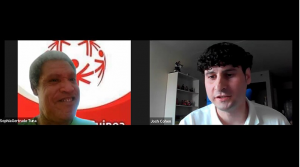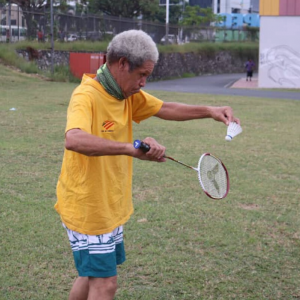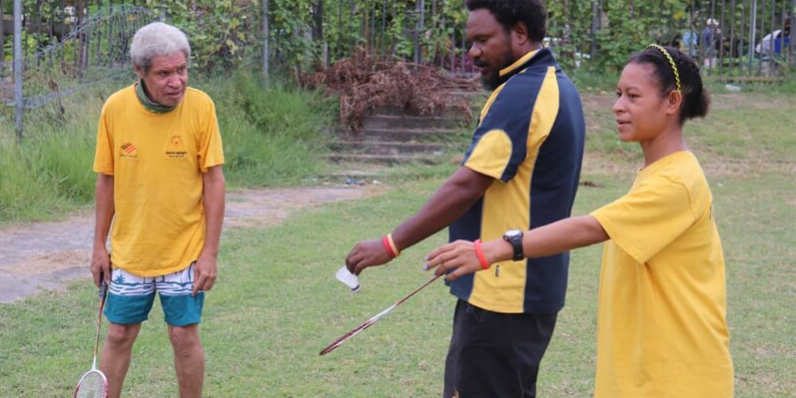World Autism Day is celebrated around the world on 2 April and designated by the United Nations to highlight the need to help improve the quality of life of those with autism so they can lead full and meaningful lives as an integral part of society. To commemorate this occasion, Josh Cohen – a former Special Olympics athlete living with autism who now works at Special Olympics HQ – held a conversation with Special Olympics Papua New Guinea badminton athlete Raphael Tipua Otoase.
Josh and Raphael talked about their shared experiences of living with autism and the positive role badminton has played in the life of Raphael, both on and off the court.

Josh: What common misconceptions or stereotypes about autism frustrate you the most?
Raphael: Sometimes people mistreat me or look down on me, but I continue to live my life to spread awareness that people with intellectual disabilities are just like everyone else. In my home country of Papua New Guinea, there is a stigma attached to people with intellectual disabilities, especially those with autism. Many of us are locked at home and cared for by our parents. Not many of us go out into the public.
Josh: Do you find it difficult at times to stay home just because you have autism when you really want to go out and be in the world?
Raphael: Yes, it’s very difficult, and to add onto that, I have trouble hearing as well. There are moments like when I’m playing sports for Special Olympics where I’m happy to be outside and in the world, but just like anyone else, there are moments where I prefer to just stay at home.
Josh: What would you most want people to understand about your autism?
Raphael: I was a council member with Special Olympics Asia Pacific region, and I had the opportunity to travel to the United States to share my experiences. In countries like the United States, there’s a lot more recognition of people with intellectual disabilities, especially those living with autism. In my home country of Papua New Guinea, there is very little support or welfare services for those of us with intellectual disabilities. People like this typically do not go to school, and many times, their families are frustrated with them so they are neglected. As for me, I live in a disability services home where I’m taken care of by the staff. I will continue to spread awareness here in Papua New Guinea through my participation in Special Olympics sports and other means including radio, television, and newspaper interviews so the local government will recognize people with intellectual disabilities, especially those with autism, as full members of society.

Josh: Let’s talk about badminton. How did you pick up the sport?
Raphael: I like to play sports not only because it keeps me active and healthy, but it also allows me to socialize with other people and helps me to make friends. I especially enjoy badminton because of the fast-paced nature of it and the teamwork component.
Josh: That’s good! I played basketball and softball with Special Olympics, and totally understand how this could help you socialize and make friends because these sports affected me the same way. Let’s go back to badminton. What about it brings you joy?
Raphael: I am now 57 years old, and playing badminton is a way to keep me both fit and healthy. It’s been a great sport for me to pick up, and because it doesn’t require too much equipment or a ton of actual physical contact, I feel confident it’s a sport I’ll be playing for the rest of my life.
Josh: Do you believe that other individuals with autism would benefit by playing badminton, and if so, why?
Raphael: Well, to start, it makes me very happy when I’m playing badminton. I’m always with my friends when I’m playing badminton, and it’s allowed me an opportunity to be both active and social at the same time. In a world where I spend so much time alone and at the care of others, I feel my full self when I’m on the badminton court. There’s just a certain amount of calmness and relaxation I get when I play.
Josh: How has your Special Olympics badminton coach helped you improve your game?
Raphael: My coach is friendly, helpful, and patient with me. Most of the time when we meet up, he’ll let me play and then step in when he feels like there’s a teaching moment. I’ve noticed a significant improvement in my game since working with my coach, and I would encourage others with intellectual disabilities who are interested in picking up badminton to find a Special Olympics coach. They can help you in so many ways and really make an impact on your game.
Josh: How has your badminton game developed since you began training?
Raphael: We’ve got a tournament that’s coming up next month, so we’ll see! I’m hoping to show my skills there, and really hoping to represent Papua New Guinea at the 2023 Special Olympics World Games in Berlin.
Josh: How have your badminton skills on the court helped you off the court?
Raphael: I’m still learning a lot from badminton, but I know for certain it brings me great confidence when I’m off the court.
Josh: What brought you to play badminton?
Raphael: It’s a sport that’s super easy to pick up and brings everyone that plays it joy. As a person with autism, I was looking for a sport where I could improve my physical fitness, work on my social skills, and meet new people. Badminton has done all these things for me and much more.
Josh: Amazing! Well, it certainly sounds like you’ve made the most of the sport and you’re truly doing great work in Papua New Guinea. Thanks for taking the time to talk to me, Raphael!
Raphael: Thank you, Josh!






